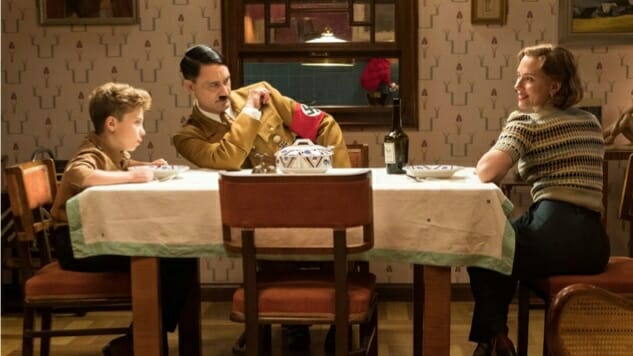Sympathy for the Devil: How Jojo Rabbit Challenges Viewers to Be Responsibly Empathetic

“I’m worried he’s going to make Hitler sympathetic,” a colleague whispered behind his hand before a pre-dawn screening at TIFF. In a few days, Jojo Rabbit, the latest from auteur writer/director Taika Waititi, would make its debut. What would Waititi’s latest have to say in the same festival that already produced the wildly divisive Joker, the crowd-pleasing Knives Out, and the arresting Marriage Story? How did Hitler fit into the narrative? Having paid close attention to the director’s early work, I ought to have expected the tender, thought-provoking and gorgeous exploration into anger and despair. The slapstick comedy evenly blends with the highbrow monologues that signal the arrival of a new age Charlie Chaplain. But, I couldn’t have predicted I would cry at a Nazi’s death.
In the opening moments of Jojo Rabbit, a German-language cover of “I Want to Hold Your Hand” by the Beatles plays over the fanatical cheers of the Nationalists lining the streets for their führer. Using historic black-and-white footage with the rocking guitars that would launch Beatlemania twenty years in the future creates a more immediate understanding of the inner clockwork of 10-year-old “Jojo” (Roman Griffin Davis). Davis delivers a performance far beyond his 11 years: Lonely and isolated, he portrays the desperation and the vulnerability Jojo possesses as he enters the Bund deutscher Arbeiterjugend (Hitler Youth).
Run by the recently demoted Captain “K” Klenzendorf (Sam Rockwell), the Hitler Youth Summer Camp trains boys to hunt and throw grenades, while girls are taught to how to bandage a wound and give birth. But to Jojo, it represents his opportunity to become a man and a member of Hitler’s army. Production designer Ra Vincent details Adolf Hitler’s god-like status in Jojo’s mind by cementing his mug all over Jojo’s bedroom walls. Waititi’s script showcases Jojo’s fan-boy nature with detailed facts about the dictator with which the boy burdens his mother (Scarlett Johansson), and a charismatic imaginary Hitler that comes to Jojo’s aid when he’s feeling his most vulnerable.
Like a Whitman-esque dream, imaginary Hitler (Waititi) contains multitudes. Waititi performs the role of dictator with such ridiculous fanfare, his interpretation couldn’t be mistaken for the real thing. Occasionally clown-like with a reserved charisma aimed directly at Jojo’s sensitive side, Hitler works to build the young boy up like a father would pal around with his son. But when dismissed, this internal figure becomes irate, launching into a horrendous tirade typically reserved for large crowds. Representing the fear of going against the state, the insecurity around his status as a male, and the longing he has for his father, who has been away at war for over a year Jojo’s imagination powers his entire world view; it just happens to take the shape of Hitler.
The anger linked to that symbol permeates the tender-hearted Jojo. His mother, Rosie, knows the son she raised still exists behind the rhetoric he recites. She tries her best to reach him. Though disgusted by his beliefs, she pours love into him—spending every moment she has trying to convince him he is worthy of love, explaining to him the destructive power of hate, and doing her best to keep the cruelty of the world outside her door. Johansson stuns as an even-headed but passionate single-mother. Her dry wit mixes well against Davis’ sincere ignorance and bratty temper tantrums.
Waititi makes it impossible to forget Jojo’s youth and vulnerability. Every adult in his life, aside from his mother, treats the Nazi occupation as either a glorious opportunity for adventure or a holy responsibility to the fatherland. Either way, dedication to the cause becomes a measuring stick of an individual’s worth. I couldn’t help but think of the young men indoctrinated into the rising white supremacist movements in the United States detailed in an Anonymous account in The Washingtonian titled “What Happened After My 13-Year-Old Son Joined the Alt-Right.” In the article, a concerned mother wrote: